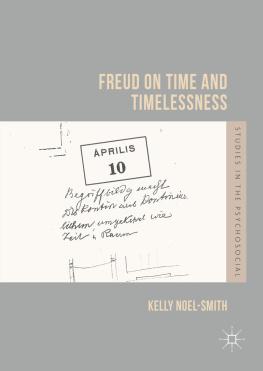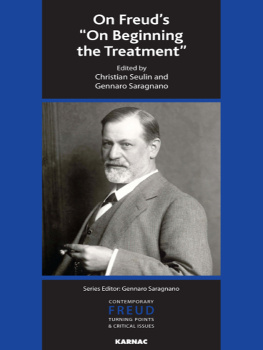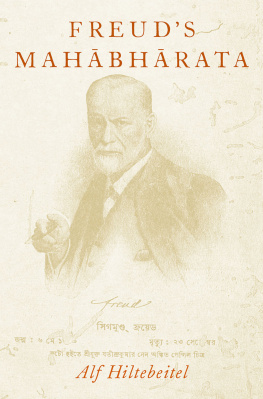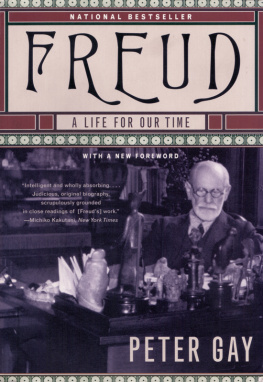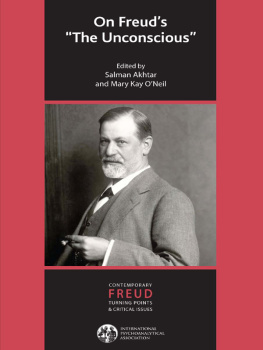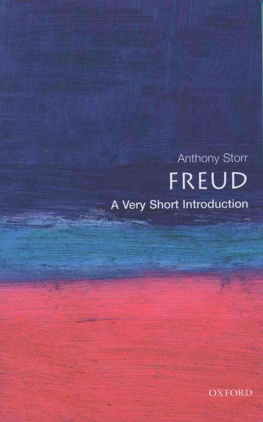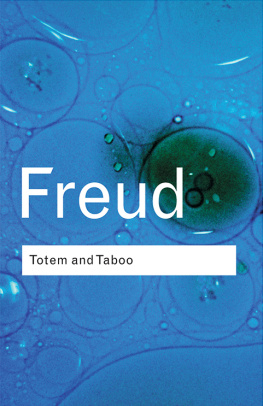1. Introduction
More often than not, there is no reference to Time in the index of books on psychoanalysis. This evidence of a lack of psychoanalytic writing on time is striking because temporality forms such an important theme of Freuds work. The timeless unconscious; Nachtrglichkeit ; the endless repetition compulsion; and the processes of consciousness, remembering and working through: all these involve temporality. Andr Green asked rhetorically: Was there ever a point in Freuds work where he was not concerned by the subject of time? (Green , p. 9); if there was, it is difficult to find.
Psychoanalytic theory is permeated by time, and the practice of psychoanalysis seems shaped by it. It is largely the losses that time brings with it which take us into the consulting room: loss of our youth, our opportunities, our loved ones and our future. At the outset, the parties to a psychotherapeutic alliance make a substantial commitment to spend significant time together, and a condition of whether what happens between them is psychoanalysis is the quantity of time, in terms of number of sessions per week, which they share together. Within the sessions themselves, the temporal boundaries are usually strictly observed. Hilda Doolittles account of her analysis with Freud includes a nice example: The other day the Professor had reproached me for jerking out my arm and looking at my watch. He had said, I keep an eye on the time. I will tell you when the session is over. You need not keep looking at the time, as if you were in a hurry to get away (Doolittle , p. 17).
The paradox is this: time and timelessness are fundamental principles of psychoanalysis, yet Freud does not present a consolidated theory of temporality. Although temporal themes run throughout Freuds work, his specific references to time are highly qualified, any idea of a theory of time being couched in terms of hints (Freud , p. 455).
Not only is there a lack of a consolidated account by Freud of his theory of time, but there is also a marked absence in the secondary literature of its remedy. In 1989, Andrea Sabbadini was able to say that: In recent years, several authors have published their views on various aspects of time in psychoanalysis, but with the exception of Arlow (, p. 1).
In identifying the lack in the literature of a systematic account of Freuds theory of time, Sabbadini and Green position themselves as contributors to its remedy. Sabbadini identifies two further contributors: Hartocollis and Arlow. These four are members of a small group which writes specifically about psychoanalysis and temporality, the first member of which was Marie Bonaparte. She published her classic paper, Time and the Unconscious, at the very end of Freuds life (Bonaparte , p. 442). But Bonapartes gusts of timelessness remain unexplored and we learn no more about her claim that we destroy time from the moment we begin to use it (ibid, p. 431). Bonaparte provides, as purported proof of the lethal significance of time, our personification of time but not of space. But she offers nothing to support her argument that the concepts we personify have lethal significance. And she erroneously suggests that philosophers loathe and thus suppress the idea of time (ibid, p. 454), managing to canter over the philosophies of time of Plato, Aristotle, Plotinus, Spinoza, Kant and Bergson in the space of a few glib paragraphs, concluding that philosophy is the occupation par excellence of the crazy creature man so often is (ibid, p. 483). As a technical contribution to the psychoanalytic discourse on time, Bonapartes paper is, I think, limited. That said, there is value in her record of Freuds views about time, provided that a qualification about its accuracy is borne in mind: for (as I indicated above) Freud wrote to Bonaparte after the publication of her paper to say that he had not fully informed her, or anyone else, of his ideas about time. Some of the points Freud made to Bonaparte, as recorded in her paper, are, however, corroborated by their contemporary correspondence, and they add to our understanding of Freuds thoughts on how we make time.
After Bonaparte, little is said about Freuds theory of time until Lacan brought attention to Freuds temporal notion of the aprs-coup . British psychoanalytic writing on time is scanty, rich, instead, in the provision of spatial metaphors for psychoanalytic concepts represented by Bions container, Winnicotts transitional space, Steiners psychic retreats, and Meltzers claustrum. In France, on the other hand, acknowledgement of the importance of the aprs-coup became what Green describes as a fundamental theoretical axis of psychoanalytic practice (Green ).
Of the French writers, it is Andr Green who has done most, in my opinion, to take forward the literature on Freuds theory of time, in particular, Greens ). What tend to get overlooked, according to Green, are Freuds concepts of non-unified time, as experienced in dreams, in Nachtrglichkeit , in the repetition compulsion, which is the main theme of Greens book, and in negation. Green adds two notions of his own: anti-time, that is, the illusion we have of being able to stop time; and the murder of time which takes place as a result of the death drive at work in the repetition compulsion. What of the other side of this coin, though: not the murder of time but the birth of time? One of my key objectives in writing this book was to clarify the process by which Freud thought we acquire a notion of time.
Green was not alone in suggesting that our sense of time can be distorted or can even disappear in pathological states. Bion earlier and famously made the point in his theory of thinking that, if a baby cannot tolerate the frustration of an absence, of the breast not being here, right now, then time and space are treated as something to be destroyed. Bion writes of a patient who said over and over again that he was wasting timeand continued to waste it. The patients aim is to destroy time by wasting it. The consequences are illustrated in the description in Alice in Wonderland of the Mad Hatters tea-partyit is always 4 oclock (Bion , p. 300). The literature, especially that of Andr Green, does, then, focus on what can go wrong with our sense of time; but it does not seem to address the origins of that sense of time in terms of Freuds theory of how we develop an idea of past, present and future.
Birksted-Breen is another important contributor to the literature on time. In Time and the Aprs-Coup (Birksted-Breen , p. 231). This is a critical part of how Freud suggests that we develop an idea of abstract time.
I referred to the claim made by Andrea Sabbadini that only Arlow and Hartocollis have explored themes of temporal significance systematically or originally (Sabbadini The importance of the phenomenological aspects of time is undoubted, but the works which concentrate on these aspects provide a description of our experience of time, rather than an account of the logically prior acquisition of time, which remains an unexplored aspect of Freuds metapsychology.
In summary, there is an absence within Freuds work and within the secondary literature of a full account of Freuds views on time and timelessness. In this absence, fundamental aspects of psychoanalytic theory are difficult to address fully. What did Freud really mean by insisting that the timeless processes of the unconscious must be understood in terms of what conscious processes are not (Freud , p. 339), how far can this apply to the most fundamental of riddles: that of time? It was with a view to try to answer these questions that I felt drawn to establish an account of Freuds views on time and timelessness to provide the exhaustive treatment of the subject Freud suggested was necessary back in 1920.

